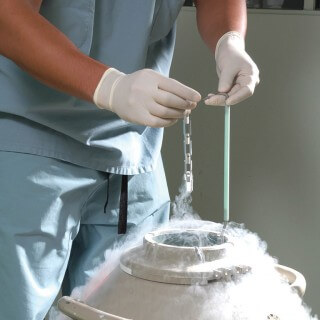Embryo freezing is an important stage in the process of in vitro fertilization (IVF) and intracytoplasmic sperm injecting (ICSI). These procedures are performed on women who are struggling to conceive due to primary and secondary infertility. Factors that can cause infertility may involve those affecting the male or female partner, or both.
During IVF and ICSI, a woman’s ovaries are stimulated with specific medications to produce numerous eggs. These eggs are harvested and then fertilized with the male partner or donor’s sperm. And this is referred to as an embryo.
Embryos which are not used for implantation in the uterus are then stored by freezing them. This process is termed cryopreservation which is a method for preserving the viability of the embryos by carefully cooling them down to -196 degrees Celsius using specialized equipment and storing them in liquid nitrogen.

The Benefits of Embryo Freezing
The following scenarios are regarded as the benefits of freezing embryos:
Being able to transfer the embryos to the uterus when the uterine environment is at its most conducive for implantation. An early rise in progesterone levels may negatively impact the rate of implantation of the embryo on the uterus. By freezing the embryos, one decreases the risk of implantation failure.
In vitro fertilization of a fresh embryo may result in serious complication such as ovarian hyperstimulation syndrome (OHSS). A way to prevent this situation from happening is by freezing the embryos and then transferring them to the uterus at a later stage when things have settled down.
Frozen embryos can also be screened for any genetic abnormalities and those that are not flawed will be chosen for implantation. This helps to avoid the development of any congenital abnormalities in the fetus.
Women who are diagnosed with cancers and who will need radiation and/or chemotherapy of the reproductive tract may consider freezing their eggs or embryos until they have completed their treatment. This is done to avoid damaging the ovaries as doing so may result in the production of abnormal eggs that may not be able to become fertilized or could result in congenital abnormalities of the fetus.
How Safe is Embryo Freezing?
Recently published clinical studies show that frozen and thawed out embryos are just as, if not slightly more, viable as fresh embryos with a similar live birth rate.
One particular study published in the New England Journal of Medicine made the following findings:
The women who participated in the study were given one cycle of IVF. One group was implanted with frozen then thawed out embryos and the other group received fresh embryos after having taken fertility medications.
Ongoing pregnancy occurred in 36 percent of women who received the frozen then thawed out embryos and in 35 percent of women who received the fresh embryos.
The rate of live births in the thawed out and fresh embryo groups was 34 and 32 percent, respectively.
This study does not only show that frozen and thawed out embryos are safe but that the ongoing pregnancy and live birth rates are at the very least equal to that of fresh embryos.
